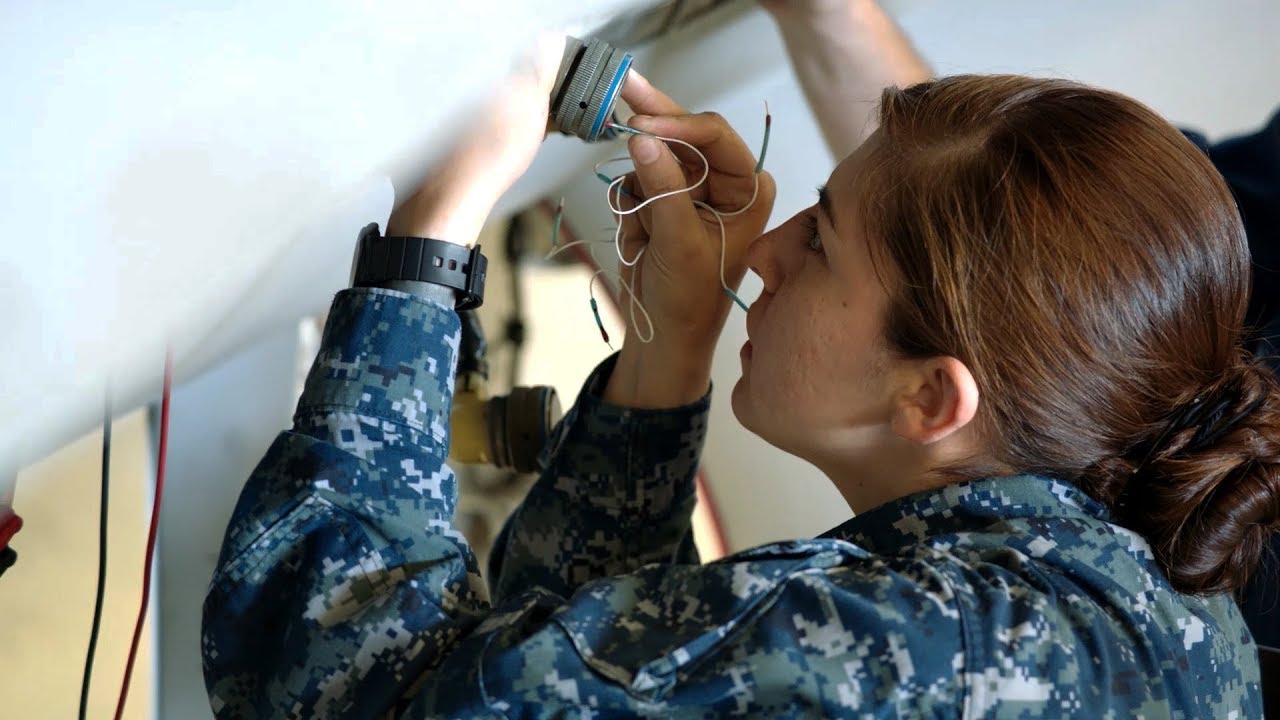What to Expect
More Information
Responsibilities
As an Aviation Electronics Technician (AT), you’ll maintain, troubleshoot, repair and test complex electronic systems related to aviation on tactical jets, fixed wing aircraft or rotary winged helicopter systems. In this role, you can expect to work with systems including digital computers, fiber optics, infrared detection, radar, laser electronics, navigation, pressure indication, and electrical power generation and distribution. Additional responsibilities may include:
- Installing modifications to aircraft electronic systems
- Performing micro-miniature module repair on computer circuit cards
- Performing electrical diagnostics
- Reading electrical system diagrams
- Repairing and maintaining power generators and electric motors
- Performing scheduled maintenance and corrosion control
Work Environment
Sailors in this career field will perform duties at sea and ashore around the world. ATs can expect to work indoors and outdoors in land-based aircraft squadrons and aboard aircraft carriers. You may work in a shop environment, clean lab, airplane hangar or office environment.
Training & Advancement
Upon completion of initial training at Recruit Training Command Great Lakes (known as Boot Camp), you’ll report for specialized training, including:
Class "A" Technical School (19 weeks) in Pensacola, FL, for training in basic aviation theory and technical knowledge, aviation electrical systems, and electrical and electronics theory and skills.
After you complete training, you may be assigned to a naval air station, squadron, aircraft carrier or other aviation facility. Promotion opportunities are regularly available but competitive and based on performance.
Advanced Training
Advanced training as an Aviation Electronics Technician may also be available during later stages of your career. For those with further leadership aspirations and a college degree, Officer roles may be available, providing opportunities to lead and train others.
Post-Service Opportunities
Specialized training received and work experience gained in the course of service can lead to valuable credentialing and occupational opportunities in related fields in the civilian world, such as employment with airlines or aircraft manufacturers.
Education Opportunities
Beyond offering access to professional credentials and certifications, Navy technical and operational training as an Aviation Electronics Technician can translate to credit hours toward a bachelor’s or associate degree through the American Council on Education.
You may also continue your education through undergraduate degree opportunities like the Navy College Program and Tuition Assistance and the Post-9/11 GI Bill.
Qualifications & Requirements
A high-school diploma or equivalent is required to become an Enlisted Sailor and an Aviation Electronics Technician. You must also be a U.S. citizen eligible for security clearance.
AT applicants should have an interest in aviation, working with aircraft, electrical systems and computer systems. You should be competent working with tools, equipment and machines to perform detailed precision work. Strong arithmetic, writing, speaking and academic study skills are also necessary. Important physical attributes include a high level of manual dexterity and physical fitness.
General qualifications may vary depending upon whether you’re currently serving, whether you’ve served before or whether you’ve never served before.
Part-Time Opportunities
Serving part-time as a Navy Reserve Sailor, your duties will be carried out during your scheduled drilling and training periods. During monthly drilling, Aviation Electronics Technicians in the Navy Reserve typically work at a location close to their homes.
For annual training, you may serve anywhere in the world, including locations in the U.S., at bases overseas, or in areas where humanitarian needs are great.
Take a moment to learn more about the general roles and responsibilities of Navy Reserve Sailors.
Most of what you do in the Navy Reserve is considered training. The basic Navy Reserve commitment involves training a minimum of one weekend a month (referred to as drilling) and two weeks a year (referred to as Annual Training) – or the equivalent of that.
Aviation Electronics Technicians in the Navy Reserve serve in an Enlisted role. Before receiving the ongoing professional training that comes with the job, initial training requirements must be met.
For current or former military Enlisted service members, prior experience satisfies the initial Recruit Training requirement, so you will not need to go through Boot Camp again.
For those without prior military experience, you will need to meet the initial Recruit Training requirement by attending Boot Camp in Great Lakes, IL. This training course will prepare you for service in the Navy Reserve and count as your first Annual Training.

































































































































